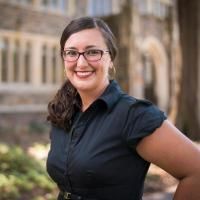Thinking about multiple identities boosts children's flexible thinking.
Date
2019-05-30
Journal Title
Journal ISSN
Volume Title
Repository Usage Stats
views
downloads
Citation Stats
Attention Stats
Abstract
Studies of children's developing social identification often focus on individual forms of identity. Yet, everyone has multiple potential identities. Here we investigated whether making children aware of their multifaceted identities-effectively seeing themselves from multiple angles-would promote their flexible thinking. In Experiment 1, 6-7-year-old children (N = 48) were assigned to either a Multiple-Identities condition where they were led to consider their multiple identities (e.g., friend, neighbor) or to a Physical-Traits condition where they considered their multiple physical attributes (e.g., legs, arms). Children in the Multiple-Identity condition subsequently expressed greater flexibility at problem solving and categorization than children in the Physical-Traits condition. Experiment 2 (N = 72) replicated these findings with a new sample of 6-7 year-old children and demonstrated that a multiple-identity mindset must be self-relevant. Children who were led to think about another child's multiple identities did not express as much subsequent creative thinking as did children who thought about their own multiple identities. Experiment 3 (N = 76) showed that a multiple-identity framework may be particularly effective when the identities are presented via generic language suggesting that they are enduring traits (in this case, identities depicted as noun phrases rather than verbal phrases). These findings illustrate that something as simple as thinking about one's identity from multiple angles could serve as a tool to help reduce rigid thinking, which might increase open-mindedness in a society that is becoming increasingly diverse. This article is protected by copyright. All rights reserved.
Type
Department
Description
Provenance
Citation
Permalink
Published Version (Please cite this version)
Publication Info
Gaither, Sarah E, Samantha P Fan and Katherine D Kinzler (2019). Thinking about multiple identities boosts children's flexible thinking. Developmental science. p. e12871. 10.1111/desc.12871 Retrieved from https://hdl.handle.net/10161/19050.
This is constructed from limited available data and may be imprecise. To cite this article, please review & use the official citation provided by the journal.
Collections
Scholars@Duke

Sarah Elizabeth Gaither
Humans are fundamentally social beings, and their interactions represent a core aspect of human nature. My research focuses on how individuals’ social identities and experiences across the lifespan motivate their social perceptions and behaviors particularly in diverse settings.
More specifically I am interested in three main questions:
1) how intergroup contact shapes interracial interaction outcomes for both racial majority and racial minority individuals
2) how having multiple racial or social identities more broadly affects various types of behavior including complex thinking, social behavior, and identity malleability
3) what contexts in particular may influence how people perceive or socially categorize each other across group boundaries
Therefore, the overall goal of my research program is to investigate the attitudinal and behavioral effects stemming from exposure to racial and gender diversity as a means to pinpoint pathways that one can utilize to foster more positive group relations for both adult and child populations. By exploring the developmental origins of social identity and intergroup perceptions we can pinpoint some of the antecedents that predict adult behavior in diverse settings.
Unless otherwise indicated, scholarly articles published by Duke faculty members are made available here with a CC-BY-NC (Creative Commons Attribution Non-Commercial) license, as enabled by the Duke Open Access Policy. If you wish to use the materials in ways not already permitted under CC-BY-NC, please consult the copyright owner. Other materials are made available here through the author’s grant of a non-exclusive license to make their work openly accessible.
